Hall of Fame
The Hall of Fame was established in 2011 by the Board of Directors to honor those officials who made significant contributions to the EFOA. The board recognizes those individuals who served as a board member, volunteer, had many years of service, worked championship games or had other notable achievements throughout their officiating career.
Each year the electors for the Hall of Fame nominate and select candidates who have been out of active service for at least 3 years. Those candidates who make it through the selection process are officially inducted at a social event held by the association each year. Inductees are honored with a plaque and a specially minted EFOA HOF Coin. EFOA thanks our inductees for their exemplary service to our local football community.
2017
Brad Lothspeich Jim Schaefer |
2016
Walt Web Andy Meyer Bob Weller |
2015
Gale Bettersworth Gene Gordon Alan Hammer Leo Jones |
2014
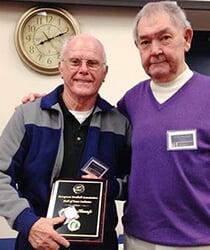 | |
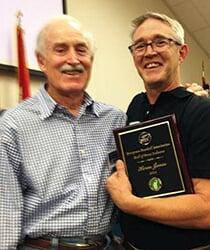 | |
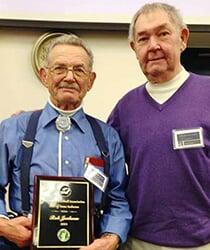 |
2013
| [being researched] |
2012
 | George Luse (son pictured) George was 27 years old when he began officiating. His career ended prematurely 31 years later when he passed away at the age of 58. He got into officiating at the urging of fellow official Garrell Evans. George loved the sport of football and the young people he officiated. That was his reward. He was known to other officials as the ultimate practical joker, pulling out scissors to cut another official’s long sleeves off when all the other officials had short sleeves on for the game. Coaches enjoyed having George on the sidelines as a line judge because he was always strict but very fair. You could always say George was dedicated to officiating because he never missed an assignment. It got to the point of being ridiculous when George officiated with a cast on a broken arm he sustained while building his house. He set the arm himself to the amazement of the doctor. Imagine an official with a “casted arm” giving an incomplete or time out signal. |
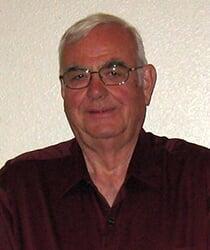 | Dick Young Dick started officiating at the age of 27, retiring after 41 years of service. During those 41 years, he officiated 2 state finals in the King Dome, as well as 5 semifinals. He was president of the association for 10 years and served on the board for an additional 20. Between being president and serving on the board, as well as officiating on the field, he was able to squeeze in his normal job as an educator in Portland. We asked Dick what prompted him to become an official. Pure and simple, he was a football coach and was offended by the officiating, consequently, a couple of his friends talked him into it. Because of years of service and dedication to the profession, the Washington Officials Association recognized Dick by presenting him with the meritorious service award. When we asked Dick the biggest reward for him: he simply said it was enjoyable as an avocation. |
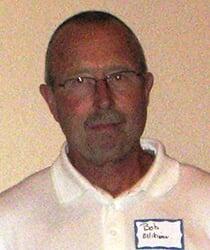 | Bob Ollikainen As a Junior High social studies and English teacher, Bob officiated in the toughest league of them all. Bob needed a break from stress so he began officiating in 1972 at the age of 25. He continued teaching and officiating for the next 35 years. During that run, Bob officiated 5 state finals and 10 semifinals. He served as president for 12 years and on the board for an additional 6 years. He also received the states meritorious service award along the way. His biggest reward during his officiating career was his chance to work around and in high school football with other officials as part of a team. Bob was an excellent mentor to new officials and helped the association tremendously as the state began to make changes in the way we officiate. Bob was incredibly meticulous to detail and rules which garnered him respect from coaches, other officials and players. |
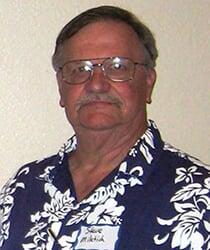 | Steve Miletich Steve started officiating at the age of 25 in 1965. He officiated for 41 years. During his 41 years, he worked in 4 finals and 12 semifinals. He began officiating at the urging of his local beverage buddies, since Steve lettered in 2 sports every year for three years at Hudson’s Bay and knew football inside and out. So it was a natural for him to officiate because of his familiarity with the game. Over the 41 years, Steve received several awards for his participation in football; meritorious service from the Washington Officials Association, and he was inducted into the National Association of Sports Officials Ring of Honor. Steve also served as President and as a board member numerous times over those 41 years. Steve’s biggest reward in officiating was that he got to work with a variety of individual athletes, coaches, and other officials. |
